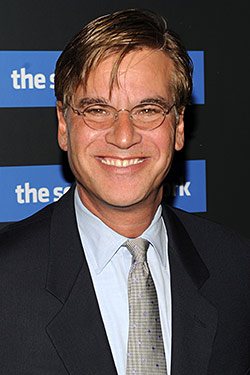
Since The Social Network came out two weeks ago, an emerging critique of the Oscar front-runner has been that it’s misogynistic. The few women in the film are slutty, crazy, mistreated, or saddled with thankless and minor parts. EW described their depiction as “horrendous, like, ’50s-level sexist.” The Daily Beast said the women in the movie “are props, buxom extras literally bussed in to fill the roles of doting groupies, vengeful sluts, or dumpy, feminist killjoys.” The Social Network’s screenwriter, Aaron Sorkin, addressed this critique when asked about it by Stephen Colbert (in very fine liberal-in-wolf’s-clothing form), saying, “The women in this particular story are prizes, it really doesn’t speak to the entire female population of Harvard, this is just the people who are populating this story.” Now Sorkin has taken to the comments section of TV writer Ken Levine’s blog to explain himself further.
Before getting to Sorkin’s remarks, it seems as good a time as any to note Sorkin’s rich, fascinating, personal history with Internet commenting. He just recently called commenters “mentally disordered,” an opinion he first formulated years ago and best expressed in an infamous episode of The West Wing (“Lemon/Lyman“) based on his own, strange personal experience with anonymous commenting. This time around, he took to the comments to respond to a woman who loved The Social Network, except for “the lack of a decent portrayal of women.” Sorkin explained:
“Believe me, I get it. It’s not hard to understand how bright women could be appalled by what they saw in the movie but you have to understand that that was the very specific world I was writing about … Mark’s blogging that we hear in voiceover as he drinks, hacks, creates Facemash and dreams of the kind of party he’s sure he’s missing, came directly from Mark’s blog …. Facebook was born during a night of incredibly misogyny. [Editor’s Note: The real Facemash ranked men as well.] The idea of comparing women to farm animals, and then to each other, based on their looks and then publicly ranking them. It was a revenge stunt, aimed first at the woman who’d most recently broke his heart (who should get some kind of medal for not breaking his head) and then at the entire female population of Harvard.
More generally, I was writing about a very angry and deeply misogynistic group of people. These aren’t the cuddly nerds we made movies about in the 80’s. They’re very angry that the cheerleader still wants to go out with the quarterback instead of the men (boys) who are running the universe right now …
I didn’t invent the “F–k Truck”, it’s real — and the men (boys) at the final clubs think it’s what they deserve for being who they are … These women — whether it’s the girls who are happy to take their clothes off and dance for the boys or Eduardo’s psycho-girlfriend are real. I mean REALLY real …
I wish I could go door to door and make this explanation/apology to any woman offended by the things you’ve pointed out but obviously that’s unrealistic so I thought the least I could do was speak directly to you.
Of course, we also wish he could go door-to-door.
Aaron Sorkin responds to a commenter in my blog [Ken Levine]

